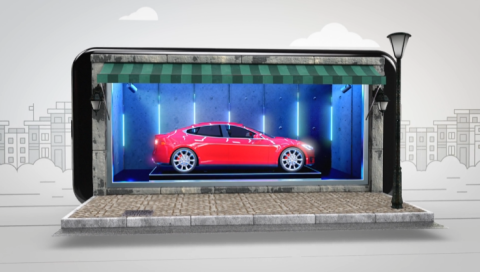The New Push for Agency Sales will Ruin Dealers

What we’ve all worried and debated about for essentially the last five years is definitely being forced upon the dealers by the OEMs. Let there be no doubt! Agency sales are here. The industry has changed its sales model because of the internet and the pandemic. Many brands are attempting to “install” the agency model. Agency sales models are certainly not new thanks to Tesla and newer EV automakers, like Lucid and Rivian, but we’ve reached the point where well-known and respected brands like Ford, Volvo, VW, and Hyundai have moved in the agency model direction.
Ford’s plans are being set in motion.
To be competitive with good ol’ Tesla, Ford thought it would be best to move its EV sales completely online, limiting the traditional dealership experience to ICEs and splitting the business into two parts - Ford Blue and Ford Model E. With the desire to not be restricted by ‘traditional selling methods,’ the brand looks to merge the individualized customer experience with online capabilities. Ford’s perspective is that because Tesla is only online, Ford can offer that personal touch by providing both in-person and online options.
The first concern is that this really limits dealers. They will not be allowed to be as competitive against other dealers who sell electric vehicles, which reduces their profits and their growth potential. This ultimately will reduce the appeal of the Ford brand as consumers opt for a non-Ford brand.
The inevitable truth is that eventually ICEs will likely be phased out. With the agency model in place, what happens to dealers then? They essentially “disappear”, becoming “agents.” They will have lost control of their businesses. Will Ford (or any other OEM) continue to attract new dealers with this new sales model? Then what? Yes, you guessed it! The next step is that these “open points” become factory owned stores, completing the agency model installation in the US.
Agency sales are spreading like wildfire.
Ford isn’t the only one feeling the pressure to fit in. Audi, VW, and Volvo are switching to the (EV) agency model in Europe next year. Their reasoning is like many others, they want to stay current with the fast-changing buyer behavior.
Interestingly, Nissan is now live-streaming with the consumer in a showroom. With the physical building and staff intact, consumers can join a video stream led by a Nissan employee who conducts the vehicle “walk-around” demonstrating what the consumer should know about the vehicle. If all goes well, the consumer is redirected to their “nearest” dealership to make the sale. Even after buying, you can still use this live showroom feature to contact staff and ask questions. At least this hybrid model allows for dealer involvement but for how long? Notably, which dealer is chosen to be contacted by the consumer? The “local” dealer cannot know whether they were “picked” to “close the deal” or was it Nissan’s “local favorite”? This is obviously a subterfuge for a gateway into agency sales.
One thing that is helping to shift consumers to online sales is a set price. When someone walks into your dealership, the price on the window typically isn’t what they will be paying. There are add-ons, title fees, trade-ins, taxes and negotiations that can change the vehicle price drastically. Some buyers prefer knowing exactly what they will be paying up front, and online car sales do that.
A set price can also help automakers soften the blow of the rising production costs and inflation. If the price is set and already inflated, it creates a little safety net. On top of that, discounts on cars are rare in the current market, so taking away negotiation really doesn’t change a whole lot as shortages have depleted inventory and most people are ordering their vehicles anyway.
An agency sales model eliminates competition between dealers, taking away a lot of buyer choice and giving power to OEMs. Where is the line drawn or will it continue to be buried by agency sales?
Surprise? Not really.
This has been looming on the horizon for several years. Prior to our seeing these more significant EV agency model announcements, Ford and GM each created their own online sales platforms -- Ford Blue Advantage and CarBravo -- hoping to strengthen their online presence while “empowering dealers” to sell online. We shouldn’t be shocked by these plans, of course because Tesla and similar companies launched with online-only options. The pandemic only served to facilitate a more rapid increase in online sales, but now that we are here, it certainly feels like the trend has increased at warp speed. .
Interestingly enough, some makers like Toyota, Honda, Kia, and Mazda have not attempted to switch to an agency model at this time. They feel strongly that the traditional franchise model is the best way to meet the customers' needs financially and to foster the long-term brand relationship. While it is admirable that they’re sticking by their values, how long until they want to join the “cool” kids?
The Truth
While OEMs tout that this is what consumers want, it really isn’t. A recent Escalent study found that the majority of respondents prefer to work with a dealer over direct sales. While you would think the other 20 percent would be millennials and Gen Z consumers, you would be wrong. A whopping 94 percent of respondents 35 and under prefer dealerships, the highest of any age group.
It is obvious that the OEM executives making these decisions must be motivated by something other than consumer desires and the health of the dealer body.
As we well know dealers had been moving solidly into internet sales before the pandemic. The purchase process almost always starts with an internet search and a customer browsing a dealer’s website. Especially through and since the pandemic, dealers have become more and more innovative with taking the purchase process online. Many allow the whole process to happen virtually, then delivering the car to the customer. OEMs treating dealers like they can’t handle their own online sales is offensive and convincingly out-of-touch with their buyers.
Final thoughts.
More and more brands are hopping on the agency sales train. When it comes to being competitive, most will do whatever it takes to be successful, even if it means cutting their brand in half or cutting off dealers altogether. It is all about enhancing their own profits at the expense of their own customers and their dealers. As long as Tesla and other comparable automakers are doing very well with direct sales, others will want what they have. Let’s hope OEMs remember where they came from, dealers hold them accountable, and lawmakers do what they can to protect franchises.






